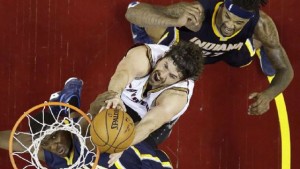
Kevin Love goes to work under the hoop between the Pacers’ Ian Mahinmi and Jordan Hill.
CLEVELAND — Before Kevin Love even played a regular-season game with the Cleveland Cavaliers last season, the forward already had made waves about his discomfort in the Cavs’ offense. In essence, he said, he played inside-out basketball his entire life. Now he was expected to play outside-in.
A few weeks later, with Cleveland off to an alarming 5-6 start, LeBron James said Love would get the ball in the post as much as he wanted to. The one caveat being, he had to “demand” it.
It was a backward approach by both Love and James, taking their concerns about the offense to the media rather than hashing it out internally. Things have improved considerably between the two, starting with their communication.
Consider the Cavs’ game against the Indiana Pacers on Sunday. Love, whom James has done everything to promote this season outside of buying up local advertising spots, was struggling. He went 1-for-6 in the first half, with four of those shots coming from the outside. This was coming off Friday’s win over Philadelphia when Love scored just 12 points on 5-for-16 shooting, with 10 of those shots coming beyond the arc.
The game ended with Love shooting 8-for-12 in the second half (with only two of those attempts from 3), including the biggest bucket of the night. Love put Cleveland up by five with 27.3 seconds remaining after James found him on a backdoor cut, and the Cavs went on to win 101-97.
What changed?
“LeBron talked to me at halftime, just got me going,” Love said. “That’s all it was. I mentioned to him I kind of wanted to free flow and get myself near the basket. That’s what I did. Got myself into a good rhythm rebounding the ball. I credit my teammates for that. It started with him and trickled down to everybody else.”
James, who was playing through a sore left leg after receiving a knee to the thigh Friday, needed more from Love. Love, who was playing through an upper respiratory infection of his own, in turn expressed where he needed the ball.
“You know, I thought his energy was really low offensively,” said James, who was, however, quick to praise Love’s first-half defense. “So I told him if he would just get his motor going offensively, the ball would start to go in for him and try to get some easy ones for you. And he started to do that and he continued to rebound and then he started scoring the ball the way he was capable of doing.”
Their biggest connection was non-verbal. Coming out of a timeout up three with 44.3 seconds left, James called a play in the huddle that would involve him setting up Love in the post. Indiana denied the entry pass, and rather than shift toward the high post to shorten the distance James would have to cover to deliver the ball, Love slipped behind the defender, prompting James to hit him with the pass as he was making the backdoor cut.
“I just knew the part of the game, I knew the reads, I’d seen what was going on in the game and I knew it would be open,” James said. “I suggested that we should run it and Coach [David Blatt] allowed me to, allowed us to put it in the works, and you know Kev did the best part of it, he finished it. I just tried to put the ball right where he needed it, where he could just catch and finish it.”
Added Love: “That was just a read for us. That comes from playing together not only in practice but so many reps throughout games where you just make that play.”
James’ halftime pep talk to Love came a game after James Jones used the break between the second and third quarters to get on the team for not playing the right way. Jones was coy when asked about his remarks, in part out of respect for the sanctity of the locker room, but also because he thinks the team should get to a place where everyone should be afforded time as a vocal leader. There’s no conch that needs to be passed around. “If you see something, say something,” Jones said, borrowing a line from a popular public safety message to sum up his philosophy.
The bigger point in play here is that a team with open lines of dialogue won’t have to use subversive methods such as talking to the media or posting cryptic tweets behind a teammate’s back. If you’re not getting the ball where you need it, tell the guy who’s controlling the ball. If there’s a play you think should be run, tell the guy who’s holding the clipboard. It can accomplish the same thing as a “demand,” the language James used with Love last season, but it comes off as a suggestion.
In turn, when James described the end result of Love being in the post more often in the second half, he said, “I noticed it and wanted to do my part.” And when Love described James approaching him in the locker room, he said, “When [James] speaks up, we listen and follow his lead. That’s a big help for me and the rest of the team.” Both of them invested.
Being direct with one another has kept the Cavs moving in the right direction, winning their sixth straight game Sunday while playing without three key players (Kyrie Irving, Iman Shumpert, J.R. Smith).
“I think at the end of the day we’re here for one common goal,” James said. “Egos need to be checked at the door and you’ve got to be able to handle constructive criticism. We’re here for one common goal and that’s to get better every single day and put ourselves in position to compete for a championship, and that’s all that matters.”
